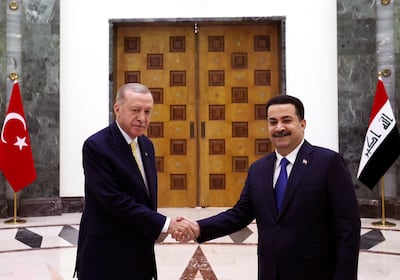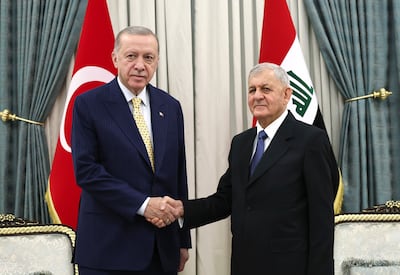Iraq on Monday rolled out the red carpet for Turkey's President Recep Tayyip Erdogan, who held talks in Baghdad in an official visit that promises to boost co-operation between Baghdad and Ankara.
Iraqi Prime Minister Mohammed Shia Al Sudani, who received Mr Erdogan at Baghdad International Airport as a 21-gun salute rang out, hailed the visit as a "clear expression of the depth of the relationship between the two countries".
In an official ceremony, a strategic framework agreement to boost co-operation in different fields, including security, energy and the economy, was signed.
"The signing of the framework agreement is a road map for a strategic and sustainable co-operation in all fields," Mr Al Sudani said in a joint press conference, adding that permanent joint committees will be established to oversee co-operation.
Discussions also focused on security co-operation and ways to deal with "the challenges of the presence of armed actors that could co-operate with terrorist groups," Mr Al Sudani added, referring to the Kurdish militant group the Kurdistan Workers' Party, known as the PKK.
The presence of the rebel group in the mountainous region of northern Iraq has been one of the contentious issues between the two counties.
The Iraqi PM acknowledged that there are "soft spots that require more control and stability in the shared border areas".
Mr Erdogan said he discussed the "joint steps the two countries could take against the terrorist [group] PKK" and welcomed Iraq's designation of them as a banned group.
Before meeting with Mr Al Sudani, Mr Erdogan held talks with the Iraqi President Abdul Latif Rashid.
The discussions focused on political, security and economic issues and ways to enhance trade, encourage investment opportunities and the issue of water rights, according to a statement from Mr Rashid's office.
The Iraqi President stressed the need for "co-ordination to combat terrorism and ensure the common security of the two countries and the region", the statement said.
Referring to PKK, he said that "Iraq rejects [the idea] that its territory is being used as a launching pad for aggressions or threats to neighbouring countries".
"We also reject any attack or violation against Iraqi cities," he said, stressing the necessity of respecting "Iraq’s sovereignty and national security". Turkey has carried out military operations inside Iraq targeting PKK fighters.
In a statement from Mr Erdogan's office, he told his Iraqi counterpart that Turkey "had expectations of Iraq regarding the fight against the terrorist organisation PKK, and that Iraq must be rid of all forms of terrorism".

PKK which has been fighting since early 1980s to gain greater autonomy for the Kurdish people.
Last month, a Turkish delegation held talks in Baghdad. During the meeting, Ankara asked for greater co-operation in its fight against the PKK ahead of a military operation this summer, according to Iraqi officials.
The two sides hailed the talks as “productive” and Turkey welcomed Iraq’s move to designate the PKK as a “banned organisation”.
The conflict between the Turkish army and PKK, escalated in the 1990s, when Turkey launched several ground operations in northern Iraq following the 1991 Gulf War.
Since then, Ankara has launched several military operations in Iraq against the group. These operations have been expanded in recent years in northern Iraq, with ground troops supported by artillery and air strikes.
The PKK is designated as a terrorist group by the US and the EU. It took up arms against the Turkish state in 1984. More than 40,000 people have been killed in the insurgency.
Mr Erdogan's last visit to Iraq was in 2011, when he was Turkey’s prime minister. During his one-day visit this time, he will meet Kurdish officials in Erbil, the capital of the Kurdish region.
Mr Rashid demanded Iraq receive a "fair share" of water. Mr Erdogan expressed his country's "understanding of Iraq's water needs, and its keenness to co-operate in this field", the statement said.
The two countries also signed a 10-year agreement on management of water resources that aims to ensure Iraq gets fair share of water flowing to its two main rivers, the Tigris and the Euphrates, Mr Al Sudani announced.
The two countries will carry out joint projects to exchange expertise in for agricultural projects such as irrigation systems.
Late on Sunday, Iraqi government spokesman Basim Al Awadi told state TV that the agreement stipulates establishing a fund in which Iraq will divert some of its oil revenue to mega water and agriculture projects to be carried by Turkish companies.

In another significant step, Mr Al Sudani and Mr Erdogan oversaw the signing of a Memorandum of Understanding between Iraq, Turkey, United Arab Emirates and Qatar to co-operate in the $17 billion rail and road project linking Asia to Europe through Iraq's under-construction Al Faw port on the Arabian Gulf coast.
The plan is known as the Dry Canal or Development Road. The proposed road and rail link will run from southern Iraq to Turkey, where it will connect to rail and road networks in Europe.
Transport ministers of United Arab Emirates and Qatar joined the discussions and signed quadripartite agreement.
"This project will economically transform the region and give it multiplied economic significance, opening up unprecedented opportunities for integration," Mr Al Sudani said.
More than 20 memorandums of understandings between Iraqi and Turkish institutions were also signed.

